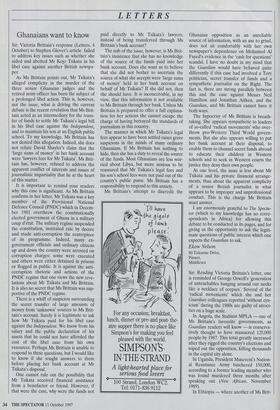LETTERS Ghanaians want to know
Sir: Victoria Brittain's response (Letters, 4 October) to Stephen Glover's article failed to address key issues such as whether she aided and abetted Mr Kojo Tsikata in his libel case against another British newspa- per.
As Ms Brittain points out, Mr Tsikata's alleged complicity in the murder of the three senior Ghanaian judges and the retired army officer has been the subject of a prolonged libel action. This is, however, not the issue; what is driving the current debate is the recent revelation that Ms Brit- tain acted as an intermediary for the trans- fer of funds to settle Mr Tsikata's legal bill in his libel case against the Independent, and to maintain his son at an English public school. To my knowledge, Ms Brittain has not denied this allegation. Indeed, she does not refute David Shayler's claim that the 'large sums of money' in her bank account were 'lawyers fees for Mr Tsikata'. Ms Brit- tain has, however, refused to address the apparent conflict of interests and issues of journalistic impartiality that lie at the heart of this matter.
It is important to remind your readers why this case is significant. As Ms Brittain confirms in her letter, Mr Tsikata was a key member of the Provisional National Defence Council (PNDC) which in Decem- ber 1981 overthrew the constitutionally elected government of Ghana in a military coup d'etat. The military regime suspended the constitution, instituted rule by decree and made anti-corruption the centrepiece of its programme. Indeed, many ex- government officials and ordinary citizens up and down the country were arrested on corruption charges; some were executed and others were either detained in prisons or flogged in public. It is against the anti- corruption rhetoric and actions of the PNDC regime that one views the new reve- lations about Mr Tsikata and Ms Brittain. It is also no secret that Ms Brittain was sup- portive of the PNDC regime.
There is a whiff of suspicion surrounding the secret transfer of large amounts of money from 'unknown' sources to Ms Brit- taM's account. Surely it is legitimate to ask how Mr Tsikata paid for his libel case against the Independent. We know from his salary and the public declaration of his assets that he could not have afforded the cost of the libel case from his own resources. Perhaps Ms Brittain is unable to respond to these questions, but I would like to know if she sought answers to them before placing her bank account at Mr Tsikata's disposal.
One cannot rule out the possibility that Mr Tsikata received financial assistance from a benefactor or friend. However, if that were the case, why were the funds not paid directly to Mr Tsikata's lawyers, instead of being transferred through Ms Brittain's bank account?
The nub of the issue, however, is Ms Brit- tain's insistence that she has no knowledge of the source of the funds paid into her bank account. Does she want us to believe that she did not bother to ascertain the source of what she accepts were 'large sums of money' held in her bank account on behalf of Mr Tsikata? If she did not, then she should have. It is inconceivable, in my view, that this information is not available to Ms Brittain through her bank. Unless Ms Brittain is prepared to offer a full explana- tion for her actions she cannot escape the charge of having betrayed the standards of journalism in this country.
The manner in which Mr Tsikata's legal fees appear to have been settled raises grave suspicions in the minds of many ordinary Ghanaians. If Ms Brittain has nothing to hide, then she has a duty to reveal the source of the funds. Most Ghanaians are less wor- ried about Libya, but more anxious to be reassured that Mr Tsikata's legal fees and his son's school fees were not paid out of the country's public purse. Ms Brittain has a responsibility to respond to this anxiety.
Ms Brittain's attempt to discredit the Ghanaian opposition as an unreliable source of information, with an axe to grind, does not sit comfortably with her own newspaper's dependence on Mohamed Al Fayed's evidence in the 'cash for questions' scandal. I have no doubt in my mind that the Guardian would have behaved quite differently if this case had involved a Tory politician, secret transfer of funds and a sympathetic journalist on the Right. The fact is, there are strong parallels between this and the case against Messrs Neil Hamilton and Jonathan Aitken, and the Guardian, and Ms Brittain cannot have it both ways.
The hypocrisy of Ms Brittain is breath- taking. She appears sympathetic to leaders of so-called 'radical movements' who over- throw pro-Western Third World govern- ments. But she also appears willing to put her bank account at their disposal, to enable them to channel secret funds abroad to educate their children in Western schools and to seek in Western courts the justice they deny their own people.
At one level, the issue is less about Mr Tsikata and his private financial arrange- ments, than about the apparent complicity of a senior British journalist in what appears to be improper and unprofessional conduct. This is the charge Ms Brittain must answer.
I am enormously grateful to The Specta- tor (which to my knowledge has no corre- spondents in Africa) for allowing this debate to be conducted in its pages, and for giving us the opportunity to ask the legiti- mate questions of public interest which one expects the Guardian to ask.
Ekow Nelson
80 Tolcame Drive, Pinner, Middlesex


















































































 Previous page
Previous page